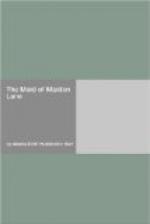Hyde became silent and speechless, and Clymer was quickly infected by the very force and potency of his companion’s agitation and distressed surprise. He heard him mutter, “Oh this is intolerable!” and then, it was, as if a cold sense of dislike had sprung up between them.—Both were glad to escape the other’s company, and Hyde fled to the privacy of his own room, that he might hide there the almost unbearable chagrin and misery this unfortunate meeting had caused him.
“Where shall I run to avoid myself?” he cried as he paced the floor in an agony of shame. “She will never respect me again. She ought not. I am the most wretched of lovers. Such a tom-fool to betray me as Anthony Clymer! A man like a piece of glass, that I have seen through a dozen times!” Then he threw himself into a chair and covered his face with his hands, and wept tears full of anger and shameful distress.
For some days sorrow, and confusion, and distraction bound his senses; he refused all company, would neither eat, nor sleep, nor talk, and he looked as white and wan as a spectre. A stupid weight, a dismal sullen stillness succeeded the storm of shame and grief; and he felt himself to be the most forlorn of human beings. If it had been only possible to undo things done! he would have bought the privilege with years. At length, however, the first misery of that wretched meeting passed away, and then he resolved to forget.
“It is all past!” he said despairingly. “She is lost to me forever! Her memory breaks my heart! I will not remember any longer! I will forfeit all to forgetfulness. Alas, alas, Cornelia! Though you would not believe me, it was the perfectest love that I gave you!”
Cornelia’s sorrow, though quite as profound, was different in character. Her sex and various other considerations taught her more restraint; but she also felt the situation to be altogether unendurable, and after a few moments of bitterly eloquent silence, she said—
“Mother, let us go home. I can bear this place no longer. Let us go home to-morrow. Twice this past week I have been made to suffer more than you can imagine. The man is apparently worthless—but I love him.”
“You say ‘apparently’ Cornelia?”
“Oh, how can I tell? There may be excuses—compulsions—I do not know what. I am only sure of one thing, that I love and suffer.”
For despite all reason, despite even the evidence of her own eyes, Cornelia kept a reserve. And in that pitiful last meeting, there had been a flash from Hyde’s eyes, that said to her—she knew not what of unconquerable love and wrong and sorrow—a flash swifter than lightning and equally potential. It had stirred into tumult and revolt all the platitudes with which she had tried to quiet her restless heart; made her doubtful, pitiful and uncertain of all things, even while her lover’s reckless gaiety seemed to confirm her worst suspicions. And she felt unable to face constantly this distressing dubious questioning, so that it was with almost irritable entreaty she said, “Let us go home, mother.”




